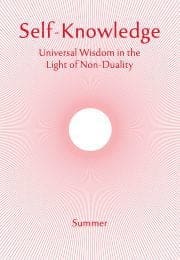The Advaita and Life
Advaita (non-dualism) is a system of thought and an art of living. It has an ideal, a system of logic which examines the ideal, and a discipline which is essential to the realisation of the ideal. Its philosophy in the form of speculative thinking is not only profound, satisfying all the demands of the intellect, but also highly instructive. The promise of life it holds is most inspiring, and in case of affliction, it is an unfailing consolation.
There are some passages in the Upanishads which, recognising fear to be a basic element in life, and its effect being to restrict the flow of life in the right direction, ethical and aesthetic, prescribe the philosophy as a sure means to the elimination of fear. Release means freedom from fear, and the consequent tranquillity of mind and inner illumination. It sanctions a code of morality which is of the highest order and gives reasons for it which are perhaps unique. Virtue, according to the Advaita, is not the end but a means to the great end—enlightenment.
Advaita is chiefly a search for Self. The unconditional and all-abiding Truth is our real being, and the purpose of philosophy is to reveal to us what we really are. The body and the mind are adjuncts, the necessary means to the highest achievement; but beyond them is the ever-shining light of Consciousness, our ‘I am.’ Self-consciousness is God-consciousness. Some writers insist on nearness to God, a sense of dependence, and prescribe fellowship with God as a means to security. But in the philosophy of Shri Shankara the goal of life is identity consciousness, expressed in the Vedic formula ‘I am Shiva,’ the highest reality.
Consciousness is immanent and also transcendental. The divided consciousness is not denied by Shri Shankara. The duality of subject and object, the existence of the delight and sweetness of the higher love, the sense of devotion and surrender of the personality to God are fully recognised in the philosophy of Advaita. But these experiences are all tentative and not ultimate. The ultimate is transcendence, which is called vidya (knowledge), the fullest vision of truth, ‘All is Brahman.’ Though the Self has the individual consciousness as its accompaniment, it soars far beyond it; it is all-inclusive and yet exclusive. To confound the empirical consciousness with the absolute consciousness is called avidya (ignorance). The cosmic experience is in avidya; it spins a universe out of itself under the direction of its Lord, the cosmic subject Ishvara. This is all in maya. Complete freedom and joy are found in the transcendental consciousness. All intuition is avidya. Brahman is absolute; it can be called by no other term except Sat-Chit-Ananda (Existence-Consciousness-Bliss).
Self is non-relational and opposed to all determinations. Thought is relational and therefore not competent to establish or prove the Self. ‘How can the Knower be known?’ says Yajnavalkya in the Brihadaranyaka Upanishad. The changing character of thought cannot be adequate to establish the immutable. Thought is merely analytical or synthetical. It presupposes something which illumines it and reveals its own existence and objects. In short, cognition is cognition, and both subject and object are revealed in it.
Is there any basis of our experience, or is it all haphazard ideation like snow falling on a wood or a lake of water?
Subscribe or enrol for free guest access to read all of this article and Self-Knowledge online.
Already subscribed or enrolled? Log in:


